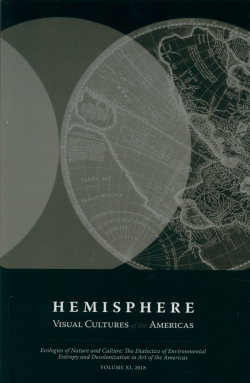Volume 11, Issue 1 (2018) Ecologies of Nature and Culture: The Dialectics of Environmental Entropy and Decolonization in Art of the Americas
Editor's Introduction to Volume XI
Ecology is broadly defined as the empirical study of interactions between organisms and their environment. This analysis, however, often assumes that the "environments" studied exist in a natural state without addressing the social constructs we use to define concepts of nature and the limits of environment. Given their interdisciplinary backgrounds, art historians are able to provide unique contributions to the intersecting fields of art and ecology by bridging intellectual gaps located at disciplinary interstices, such as those that distinguish esthetics and social histories from environmental sciences. Every artist and scholar who participates in the developing discourses centered on the dynamic between art and ecology must engage dominant ideas of the environment, which may assume a variety of forms, from the social and political, to digital or built. To engage with environments means also to engage with the dichotomous relationships that exist between species and place. Not surprising then, is the questionable, socially constructed concept of a "natural" environment in the Anthropocene, as the term "nature" itself continues to be adopted and adapted to suit any number of socio-political agendas and their corresponding methodologies.
Entire Issue
Front Matter
Contents
Editor's Introduction
Amy Catherine Hulshoff Ph.D. Student
Brazillian Landscape in the Misplaced Modernism of Glauber Rocha's Deus e o Diabo na Terra do Sol (1963)
Daniel Bataller Ph.D. Candidate
Nation Making and the Landscape in Oscar Niemeyer's Interiors
Veronica Sesana Grajales M.A. Art History
Two Stances on Water: Political Ecology in Techno-scientific Art from Mexico
Rodrigo Guzman Serrano M.A Art History
Living With Our Toxic Legacy: Parafictional Practice and the National Toxic Land/Labor Conservation Service
Joseph Sussi M.A.
Artist Spotlight
Viola Arduini M.F.A. Student
Review: Subhankar Banerjee, Long Environmentalism of the Near North Exhibited at the University of New Mexico Art Museum
Erika Osborne Associate Professor
For most of humanity's existence, we walked: An Interview with Pennie Opal Plant of Idle No More SF Bay
Amber Hickey Ph.D. Candidate
Back Matter

